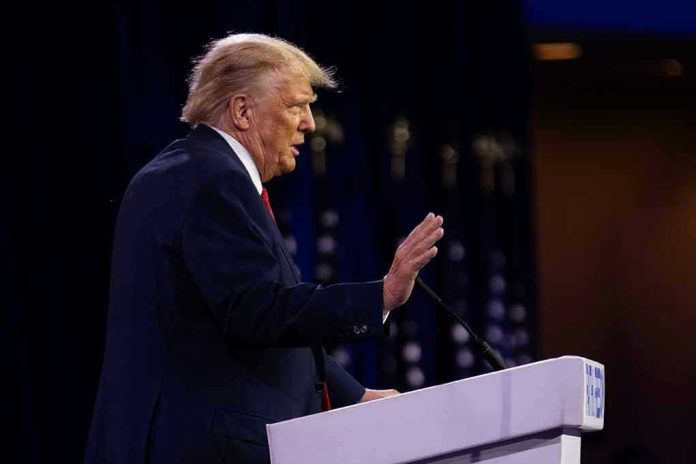
A sitting president is demanding $230 million from his own Justice Department, turning the American taxpayer into the defendant in a battle over the very investigations that once threatened his presidency.
Story Highlights
- Donald Trump has filed claims for $230 million in damages from the DOJ for prior investigations.
- The officials now reviewing his claims include his own former defense attorneys, igniting conflict of interest concerns.
- The move has no historical precedent and is shaking the foundations of legal and ethical norms.
- American taxpayers could foot the bill if Trump prevails, with broader consequences for government accountability.
Trump’s Demand: Turning the Tables on the DOJ
Donald Trump, now back in the Oval Office, has initiated an audacious maneuver: seeking $230 million from the very department he oversees, claiming damages for federal investigations into his activities. His filings focus on the Russia probe and the Mar-a-Lago classified documents case, both of which dominated headlines and consumed public attention for years. The claims are not idle threats; they are formal administrative filings, the required precursor to lawsuits under the Federal Tort Claims Act. Trump’s demand places the American taxpayer in the hot seat, raising fundamental questions about accountability, precedent, and the ethical boundaries of presidential power.
Scrutiny intensifies because the DOJ’s review is now led by senior officials who once served as Trump’s personal defense attorneys, notably Deputy Attorney General Todd Blanche. This convergence of personal loyalty and public responsibility is unprecedented. Ethics scholars and government watchdogs warn that the conflict of interest is so basic and so glaring that it undermines confidence in the impartiality of the process. Critics argue that Trump’s claim represents a potential abuse of office, while supporters insist he is justified in seeking redress for what he describes as politically motivated persecution.
The Timeline: From Investigation to Compensation Claim
The road to this moment winds through nearly a decade of scandal, investigation, and political warfare. The saga began with Special Counsel Robert Mueller’s probe into Russian interference in the 2016 election and alleged ties to Trump’s campaign. Years later, the FBI’s search of Mar-a-Lago for classified documents set off another firestorm. Trump has consistently maintained that these investigations were partisan attacks, and now, with federal cases dropped following his reelection, he is seeking monetary compensation for what he claims were violations of his rights. The administrative claims were filed in late 2023 and summer 2024, and by October 21, 2025, Trump publicly confirmed the $230 million figure, insisting that any award would be donated to charity or used for public projects like White House renovations. Yet the filings are for personal damages, underscoring the contradiction at the heart of the controversy.
Trump’s approach is deeply entwined with the political and legal power dynamics of Washington. As president, he holds ultimate authority over the DOJ, but his claims force his own appointees to weigh personal loyalty against their duty to the public. The officials reviewing the case must decide whether to approve, deny, or settle the claims—decisions that could shape legal precedent for decades to come. Congressional oversight looms, and public opinion is sharply divided, with many Americans alarmed at the prospect of taxpayer money funding a personal payout to the president.
The Stakes: Precedent, Ethics, and Public Trust
Legal experts are nearly unanimous: there is no historical precedent for a sitting president seeking damages from the DOJ for investigations conducted before or during their administration. Past presidents have criticized investigations, but none have sought personal financial compensation. The current situation exposes cracks in the separation of powers and tests the resilience of America’s ethical frameworks. If Trump’s claim is approved, it could set a costly and controversial precedent, inviting future presidents to pursue similar actions. If denied, litigation may follow, keeping the story in the public eye and further eroding trust in government institutions.
The economic, social, and political ramifications are substantial. Any settlement would come from taxpayer funds, fueling public outrage and deepening partisan divides. The legal community faces new ethical dilemmas, as the case blurs the lines between personal grievance and the public interest. Political analysts suggest that Trump’s maneuver is both a legal tactic and a strategic effort to reinforce his narrative of victimization and government overreach—a narrative that has fueled his political resurgence and galvanized his base.
Expert Perspectives: Conflict of Interest and Constitutional Questions
Bennett L. Gershman, a prominent ethics professor, has described the conflict of interest as so fundamental that “you don’t need a law professor to explain it.” Legal scholars caution that the independence of federal law enforcement is at risk, and the prospect of a president seeking personal compensation from the government he leads could undermine the very foundations of American democracy. Trump’s supporters, however, argue that justice demands accountability for what they see as politically motivated investigations, while critics warn of a dangerous erosion of legal norms and the separation of powers.
Major news outlets have corroborated every key fact in the story: Trump’s demand, the amount, the process, and the ongoing review by DOJ officials with personal ties to the president. The outcome remains uncertain, but the implications are profound. The story is more than a legal dispute—it is a test of America’s principles, a challenge to the boundaries of presidential power, and a moment that will echo through history, regardless of the final verdict.



